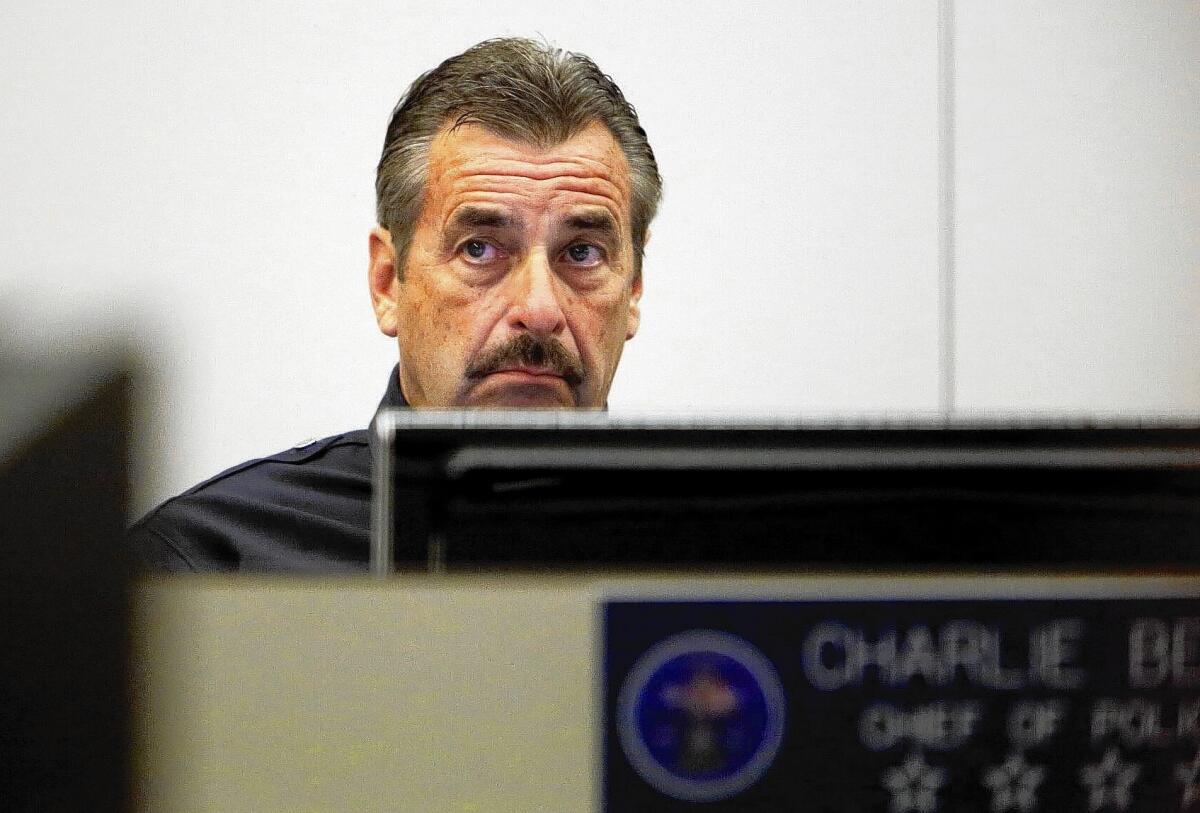L.A. Police Chief Charlie Beck reappointed to second five-year term

- Share via
Los Angeles Police Chief Charlie Beck won a second term in office Tuesday but acknowledged he must now work to address shortcomings that have come to light in recent months.
In the run-up to the vote, Beck endured a rocky evaluation process. He faced questions about his record of disciplining officers, the accuracy of crime statistics, a lack of transparency, and his role in department business involving his daughter, who is a Los Angeles Police Department officer.
Getting reappointed was “much more difficult than I anticipated,” he said after the civilian Police Commission’s 4-1 vote. “Just like anything that is difficult, it builds character. Just like anything that is difficult, it teaches lessons. And believe me, I learned lessons.”
Beck said he and his top officials needed to do more to be “transparent beyond reproach. We have to make sure that everything we do builds that bank of trust with this city.”
Mayor Eric Garcetti, who appointed the commissioners, made clear in recent weeks that he wanted Beck, 61, to remain. As such, the outcome had been widely expected.
Calling Beck “a man who has been a distinguished part of this department for 37 years,” commission President Steve Soboroff highlighted the city’s low crime levels under the chief, including a reduction in gang crime, and Beck’s success in strengthening the LAPD’s ties to various communities.
“When crimes hit record lows and positive community partnerships hit record highs, good things happen,” Soboroff said.
But commissioners also used Tuesday’s vote as an opportunity to tell Beck, who makes $325,000 a year, that he had significant work to do in his next five years.
Commissioner Paula Madison, a former journalist and media executive, ticked off several issues she said needed the chief’s attention, including the department’s flagging recruiting efforts, the need to promote women and minorities into higher ranks, and a wave of impending retirements by top officials.
Commissioner Robert Saltzman, a USC law school dean who cast the lone vote against Beck, said the chief had done well in some areas but had “fallen short of the commission’s expectations” in other important aspects of the job. He and others were particularly focused on what they described as Beck’s inconsistent punishment of officers and reluctance in keeping his civilian bosses informed.
As recently as January, Beck was viewed by most to be a shoo-in to win reappointment.
Under his command, the LAPD has posted statistics showing continued drops in overall crime and dramatic declines in gang crime. The chief is also credited with keeping the agency on an even keel despite considerable budget cuts that included the near elimination of cash payments to officers for working overtime. The LAPD has nearly 10,000 officers and an annual budget of more than $1 billion.
In many ways, Beck also picked up the mantle of his predecessor, William J. Bratton. In particular, Beck built on Bratton’s success forging ties with poor and minority communities, where the police had long been distrusted as abusive and corrupt.
But in February, the stretch of trouble for Beck began when he drew a rare public rebuke from Garcetti and Soboroff for choosing not to seriously punish a group of officers involved in a badly flawed shooting.
Things got worse for Beck in the following months. He angered commissioners and officers by refusing to fire a well-connected officer who was caught on tape uttering racial slurs about a black man and later denied it. Beck stood by the decision, but it brought to the surface a deep well of discontent among officers who say the chief does not mete out punishments consistently.
Commissioners also were upset the chief had not kept them apprised of brewing problems in the department, such as when officers assigned to some of the city’s roughest neighborhoods had tampered with video equipment in patrol cars to avoid being monitored.
In recent weeks, scrutiny of Beck intensified as he came under fire for two cases involving his daughter. Commissioners complained that he failed to alert them that the department had purchased a horse from his daughter, who is assigned to the LAPD’s equestrian unit.
When pressed to explain the purchase, Beck at first insisted he had recused himself entirely from the decision but backtracked when documents surfaced showing he had approved the deal.
Complicating matters for Beck was a Times investigation this week showing the department had underreported violent crimes during a recent one-year period. The findings prompted the commission’s inspector general to launch a broad inquiry into the accuracy of the LAPD’s crime statistics.
Beck’s ability to lead in his second term may be tested by the questions over crime stats, the anger felt among officers over the discipline issues, and frustrations over salaries and overtime.
At times, the steady barrage of controversies rattled Beck, who seemed to bristle at the challenges to his authority and flashed a rarely seen anger over the stories regarding his daughter.
After blaming some of the revelations on detractors who were trying to undermine his reappointment bid, Beck struck a more conciliatory tone Tuesday.
“As we move forward, perhaps most importantly, we put aside the politics and the drama and the infighting that became a hallmark of this reappointment process,” he said.
The process, he said, “brought out the best and worst in me and revealed the best and worst in the Los Angeles Police Department. But through that process, I learned what’s important to this city in a way I had not known before.”
Twitter: @joelrubin
Times staff writer Ben Poston contributed to this report.
More to Read
Sign up for Essential California
The most important California stories and recommendations in your inbox every morning.
You may occasionally receive promotional content from the Los Angeles Times.














